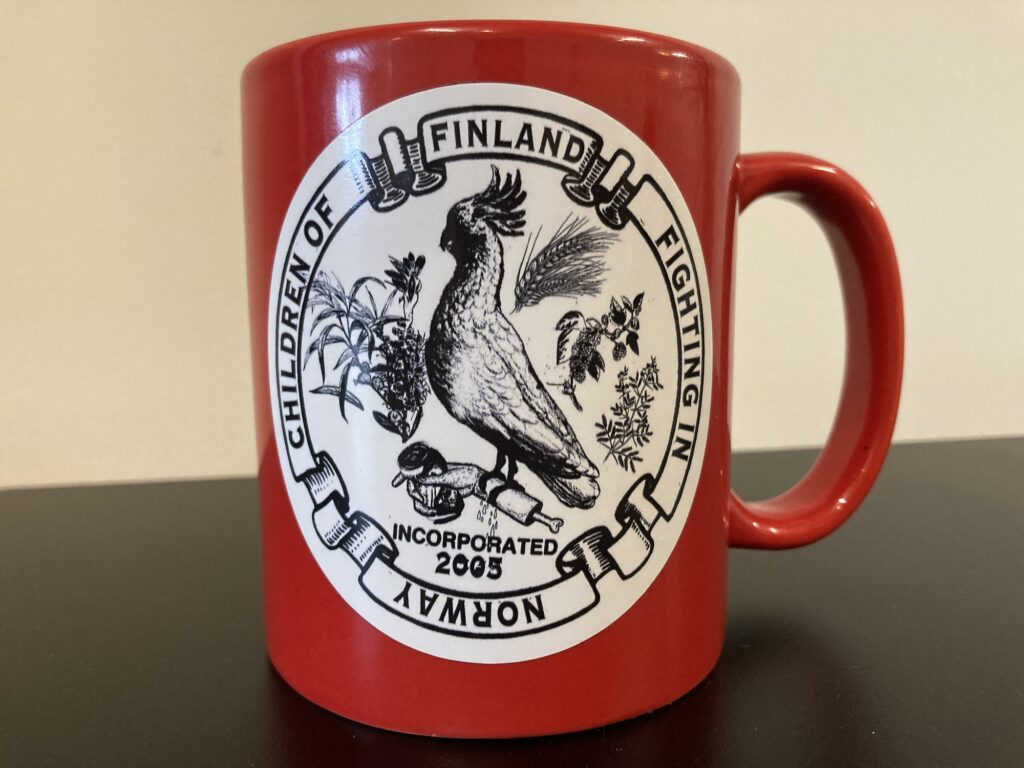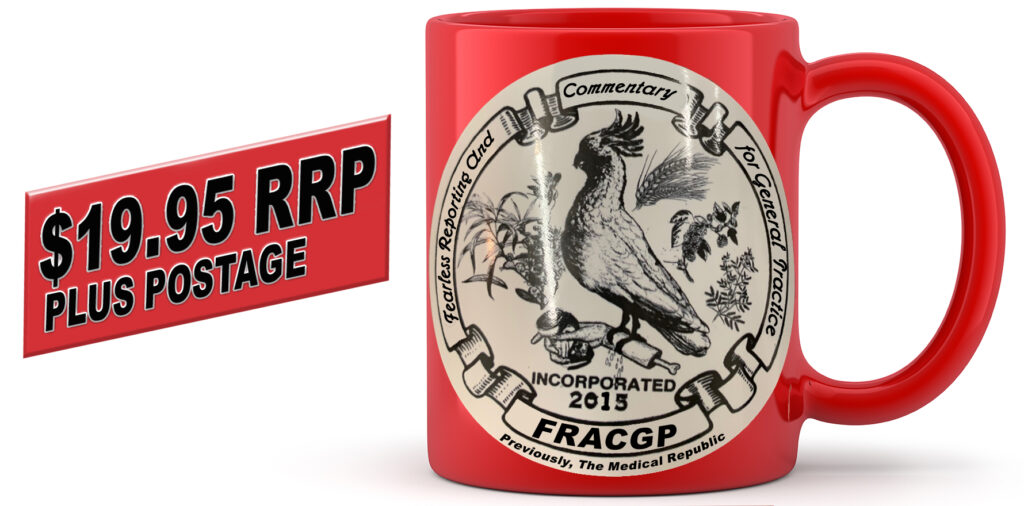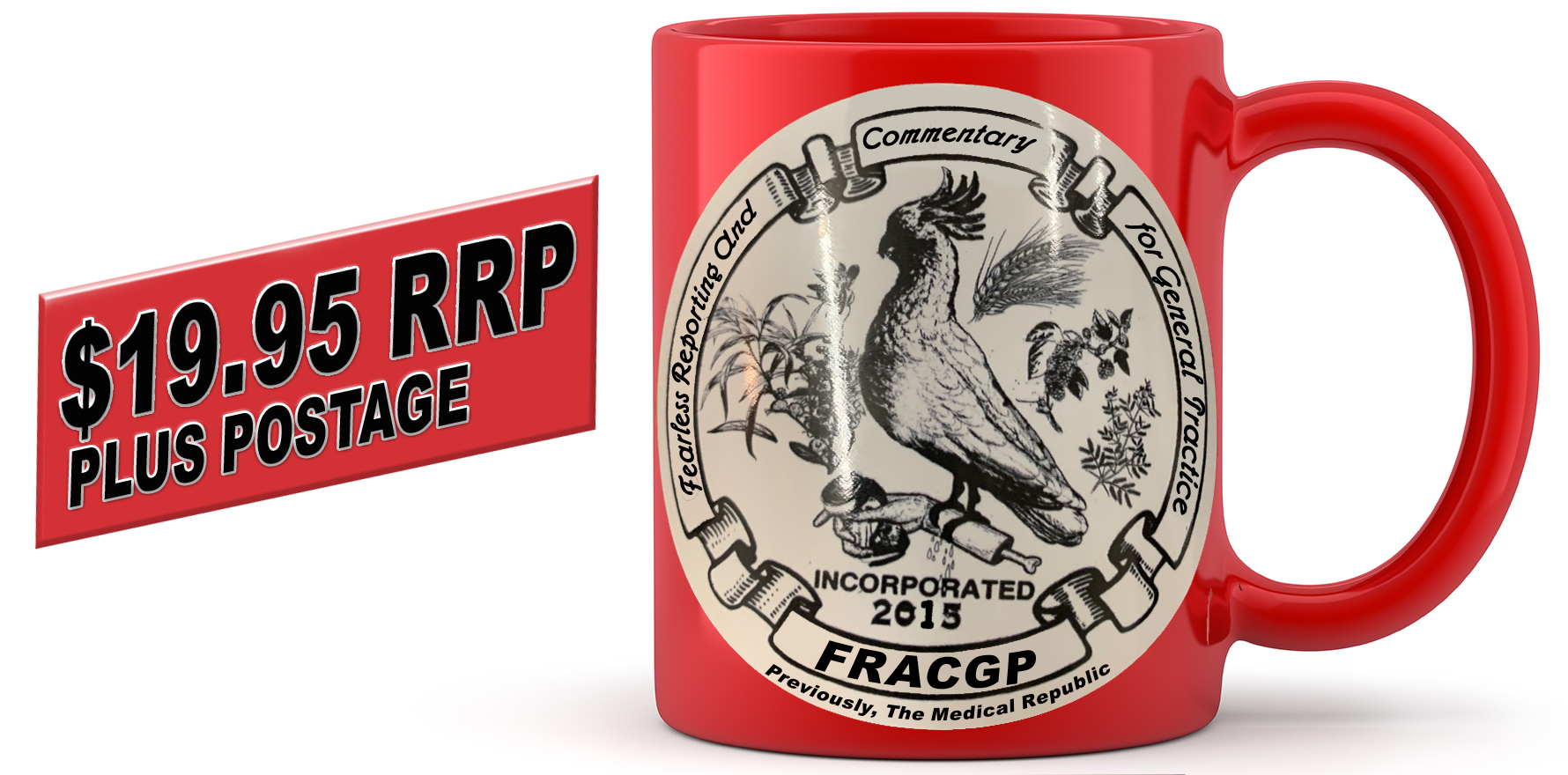You can quit either college and maintain your billing status. Your letters, well, it depends – but what do they actually mean?
My daughter once played in a band (Deviated Septum) that was the support act for a band called Coffin (Coffin still plays as a pretty good Sydney based punk/heavy metal outfit if you’re interested in seeing them).
Note: one of the comments we got over the weekend on this story suggested that the RACGP had registered FRACGP as a trademark. That turns out to be true. We didn’t think about applying for a trademark. We applied for Copyright protection. But trademark protection is important and we should have checked that as well. The RACGP quite correctly has a trademark for FRACGP which is an important protection, and we didn’t report that. We probably should have and it changes the context of this story somewhat, in that we have implied they didn’t go to much trouble to protect the FRACGP brand, and clearly, they have gone to some trouble. So apologies to the RACGP for not checking Trademark protection, thankyou to that reader who informed us, and warned us, about that protection, and we have altered the story now to include this important information.
The story goes that Coffin isn’t named after the funeral item of the same name but it is an acronym for Children Of Finland Fighting In Norway. This Scandinavian take on the name appears on all the bands merchandise (our print production editor has their coffee mug, picture below) but I’m pretty sure COFFIN started as ‘coffin’, the box you put dead people in for a funeral, but the band members got sick of that meaning and decided to reinvent their brand.

In this tradition, The Medical Republic thought it might be able to reinvent the FRACGP brand and help everyone stuck in the current dilemma of whether to leave the colleges and save up to $1495 per year, or stay and keep your letters.
After asking a lot of increasingly specific questions, this week the Department of Health (DoH) and the RACGP clarified that you can leave your college before the next membership renewal date and maintain your CPD points yourself, and by doing so, maintain your higher level of Medicare rebates. (Apologies to anyone who read First Draft last Saturday in which I pretty much said the opposite – it has been a tortuous journey figuring out what is actually going on.)
The detail on that is in this story by Francine Crimmins HERE. Unfortunately we can’t offer much of an explanation as to why the DoH and the RACGP made it so hard for everyone to work this out. In the RACGP’s case, it’s quite possibly that the more confused you are the better, so you don’t actually leave if you really want to.
But if you are thinking finally that’s all cleared up, it’s not quite.
We’ve been curious whether you can leave either college and keep using your postnominals, FRACGP or FACRRM.
That’s a matter for each college, AHPRA told us.
With ACRRM it’s easy: it says here that you have to stop using your postnominals when you stop being a paid-up member.
But the RACGP told us in carefully couched language: “Fellowship of the Royal Australian College of General Practitioners is a qualification recognised by Ahpra for specialist registration. While they remain a financial member, a Fellow can refer to themselves as a Fellow of the RACGP and use the postnominal “FRACGP” in accordance with regulations.” [Our emphasis.]
That seemed to say if you stop paying, you stop using FRACGP – “Your money or your letters”. It overwhelmingly suggests that, but doesn’t quite make it explicit.
We reported on that and were swiftly pulled up by RACGP members who told us that was wrong, that this issue has been repeatedly raised and that members are consistently told that, unlike at ACRRM, they can keep their letters.
We asked the college to clarify, and to make it as unambiguous as possible, but received the response: “We don’t have more to say on this matter at this time.”
The relevant clauses of the constitution are similarly open to interpretation:
9. Every Fellow admitted to Fellowship must fulfil the Quality Assurance and Continuing Professional Development requirements and is entitled to: (a) while he or she remains a Fellow, to hold himself or herself out as a Fellow and to use the post- nominal “FRACGP” in accordance with regulations;
21. Subject to clause 9(a), the Board may prescribe the use of a post-nominal to denote successful completion of a College assessment or examination. Unless otherwise authorised by the Board in accordance with this clause 21 or clause 9(a), members are not entitled to use any post-nominal that indicates membership of or association with the College or any College assessment or examination.
110. a. xiii. “Fellow” means a member of the College who is admitted as a Fellow under Part 2.2 of this Constitution thereby becoming entitled to use the post-nominal “FRACGP” under clause 9(a) and whose membership of the College has not been terminated, but does not include an Honorary Fellow or any other person not entitled to use the post-nominal “FRACGP”; and “Fellowship” has a corresponding meaning;
It hangs on the phrase “whose membership of the College has not been terminated” – do you have to get kicked out for misconduct to be docked your letters?
The college could have spelled it out for us, but hasn’t. Perhaps it is not averse to having the idea float around that quitters lose their letters.
We’ve since received a statement from the Australian Society for General Practice to say that isn’t the case, and we’ve gone back to the college yet again for clarification.
But for the rest of this editorial, we’re going to interpret the college’s words as we think we were meant to – “Your money or your letters” – and look at why GPs still shouldn’t let this be a factor in their decision-making.
Fearless Reporting And Commentary for General Practice
Before we get into the pros and cons of colleges insisting on payment for letters, The Medical Republic attempted this week to register the business name Fracgp and the domain name fracgp.org.au and apply for copyright protection on our interesting new business name.
That we are declaring that we applied for copyright protection is a pretty sure sign some group somewhere might now weigh into the application and prevent us from getting it.
If that group is reading this, please don’t waste the money, as we don’t have any intention of following that through (although it did cost us $799 to apply for 10 years of copyright protection).
As it turns out the RACGP has trademark protected the letters. We didn’t think to apply for a trademark, and if we had Im sure we would have run into immediate trouble, and given they have that protection Im going to assume that us getting the business name and URL, would not be of any use either.
We had thought it was interesting that the college hadn’t thought to go to any of the reasonably inexpensive and obvious measures of brand protection of FRACGP, but by getting trademark protection, they probably have. And we wasted our money on trying to be just a bit too smart really.
There’s a lot to unravel in the debate in terms of money, branding, the college’s focus on revenue not member value, CPD and how all of this relates to the actual maintenance of the professional status of a GP.
In the tradition of Coffin, who we are pretty sure made up the Norway children thing long after they came up with their name, in our case, FRACGP obviously stands for Fearless Reporting And Commentary for General Practice. You can see our planned logo to be used on our new range of branded mugs below (only $19.95 plus postage).
You pronounce it “Frack”, pause, “GP”, not as a list of letters.
“Did you read Frac GP last night?…”
So it’s actually pretty different, though both uses are applicable in the world of general practice.

We figure that maybe everyone who subscribes to our newsletter and media services is really a member of our club, so they can use our brand anywhere they like.
OK, maybe that is too far.
What’s in a string of letters?
The cases for and against the colleges being able to continue charging GPs for the use of the FRACGP/FACRRM brands could be put as follows.
You might argue that it’s simply formal recognition that you’ve passed all the college exams, and training, and met their standards for practising as a GP. This is probably how a lot of GPs would have thought of the letters as they appear on their graduation plaques, often to be seen proudly adorning the walls of in their consulting rooms.
If I go to Macquarie University and I graduate with a Bachelor of Laws (LLB) and Bachelor of Science (BSc), Macquarie University doesn’t see fit to bill me each year so I can put those letters in a neat line on my CV and LinkedIn profile.
On this comparison the letters mostly refer to the attainment of a standard of competence at a fixed point in time. It is the signature training qualification to be a GP, like any other qualification from any other learning institution.
That’s one way to look at it, but there is another way.
There are lots of professional organisations that train professionals post their base university degree, and then provide ongoing services of CPD and governance, and demand that if you don’t pay a yearly membership, you don’t get to use their letters (or brand).
The accounting profession is probably the largest and most visible example of this.
The Certified Practising Accountants (CPAs) and the Institute of Chartered Accountants Australia (ICAA), make the very good argument that any numbnut can graduate from university with an accounting qualification, but that these organisations do a lot of work to filter for the good ones via specific training and education so that the public and companies using an accountant can be assured they are getting premium product.
In the case of the CPA and ICAA it’s a brand standard not only of initial attainment of a certain degree of post graduate skills, but the ongoing maintenance of that standard.
You can’t be a CPA or an ICAA without paying your membership each year, and doing the required CPD program (and passing it) for each.
Fair enough.
ICAAs tend to think they’re a little bit more qualified than CPAs, because their training is harder and more focused on specific types of tax accounting and auditing and more valued by bigger companies, whereas the CPA standard is more for broader commercial accountants. Many accountants end up having to get both qualifications, in case you think having to pay one college is bad.
The other fact in the colleges’ favour here is that most specialist medical colleges (maybe even all) will not let you use their letters each year if you don’t pay for membership.
Many specialists who are members of the Royal College of Physicians (RACP), moan about having to pay the RACP because “they need the letters”, but most of their professional status maintenance and engagement with a professional body is actually conducted by more specialist organisations. Eg, to be a privately practising rheumatologist, you need to have the letters RACP, but your main professional organisation is the Australian Rheumatology Association.
But there is now a big problem with this way of thinking about letters for the GP colleges.
The argument in almost all of the above cases for “no membership no letters” in the medical world is tied to the ability of an organisation to provide ongoing professional development to a standard that represents a green tick for the government to pay higher Medicare rebates.
But this week the government has confirmed that membership of either college is not a requirement for a GP to get their CPD each year and therefore get their government tick.
There are other problems.
The CPA and IICA are green ticks of professional standard and capability more for the general public and company clients than the government, whereas the green tick of membership of the RACGP or ACRRM has always, until now at least, been a tick for mainly for how the government will actually pay a GP.
Certainly if you are going to be employed by government departments they will demand CPA and ICAA ticks in their base tender documents, but these membership brands are far more designed to provide confidence of a certain standard of professionalism for the public, whether accountants are doing work for an individual, or a major corporation.
This is a value proposition that neither college can say it provides to GPs.
Has a patient ever walked into a GP consulting room and asked to see if they’ve got an FRACGP after their name?
Probably most relevant to this problem is that the government has stopped requiring membership of the colleges for certification to ensure they are paying the bigger money to doctors who are trained and have maintained their professional competence (via CPD).
The problem for the colleges here is that it immediately brings into focus what the real value proposition of the colleges are, after you attain your initial fellowship.
If a GP can manage their CPD themselves or somewhere else for a lot less cost than the colleges, then that GP is faced now with the question: what other value am I getting here for my money?
A GP will do a minimum of 5-6 years post graduate training to be entitled to put FRACGP or FACRRM after their names.
In those five or so years, they will need to be a member of each college for at least two of those years, and probably three, so the colleges will always get that revenue, as they should, as these are the most important GP training years.
In that time, in membership, exam and assessment fees a registrar will pay the RACGP a total of $16,662 (and three years of their life).
That’s on top of a likely HECS debt they have accumulated when they start their training of somewhere between $330,000 and $450,000.
If you look at it in this light, an ongoing $1500 per year or so might come in handy in paying off a few other things (like HECs), if college membership doesn’t offer tangible ongoing value for money.
$16,662, and three hard years of your life, earns you specialist registration with AHPRA and the higher Medicare rebate fee forever now, so long as you do your CPD as the MBA asks.
You can quit the college the moment your FRACGP lettered plaque hits the front desk in your practice.
We are going to presume here that neither college will require you to return your attainment of fellowship plaque like you must your Foxtel box when you quit Foxtel (which is a big pain). So your consulting room wall will still have your letters and a date on it, at least.
Emotionally this is likely to be important to a lot of GPs. That plaque was hard earned and reasonably expensive to get.
But how else is a GP really going to suffer here?
We can’t think of too many ways off the top our heads, other than the emotional issue of not being able to use the letters (which is probably and rightly still a very important issue for some GPs).
FRACGP and FACRRM are not at all like CPA or ICAA, both of which have been marketed heavily in major media over many years so that the public recognise each brand as an important professional standard that you should look for when you are hiring an accountant.
The RACGP hasn’t even attempted to copyright the acronym, get the URL or register it as a business name, let alone spend the enormous sums of money it would take (it would be a huge waste of money if they ever did) to brand FRACGP in the minds of Joe and Betty Patient to the point where patients started doctor-shopping for GPs with those letters after their name.
OK, a GP probably won’t be able to send a patient letter or referral letter or any professional letter, or email, and put the letters straight after their MBBS, like most do now. That’s an emotional drag for some, for sure.
But I’m pretty sure that someone could come up with some neat lettering which conveyed the same meaning of attainment.
What about:
“Graduated as FACRRM 2010”, or maybe “ga FACRRM 2010”… that even looks a bit more sophisticated than FACRRM all by its lonesome.
It’s hard to see how the colleges could object – it’s quite simply a statement of fact. You paid a lot of money and sacrifice three hard years of your life getting that qualification.
The “letters” are much more an acknowledgement of the attainment of a specialisation qualification than a standard represented by a GP being a member of a medical college now the government has broken the colleges CPD monopoly.
Unlike the CPA and ICAA brands, you don’t need the FRACGP after your name to get a job with the government or get paid better by government. You need to have done your training, attained your fellowship, and then keep your CPD up to date in the manner required by AHPRA and the MBA.
No letters required.
Unlike the CPA and ICAA brands, you don’t need the FRACP after your name for patients to think more of you. They largely have no clue what FRACGP means. If you have your graduation plaque on the wall, that’s about as far as any patient might go, and even then they have no clue what those letters mean.
FRACGP after your name gets you no more patients, no more money.
But it is nice to have.
Is “nice to have” a great value proposition from the colleges?
The colleges can hold out and say they own the right to the letters and you can’t use them unless you’re a member all they like, but the fact is GPs don’t need to have the letters after their name to do business better or engender any more confidence in their abilities from anyone, government or public.
If a GP is attached to idea of being able to write said letters after their name (as you imagine many would be after all that money and hard work) then they could just come up with something like “ga FRACGP 2010” anyway.
Or, they could probably just keep using them and ignore the college.
Can you imagine if either college used their money to sue an ex-member for using their FRACGP letters when they aren’t a paid up member?
My guess is that such a case would drive a lot more GPs away from the colleges and into the hands of new CPD homes or groups with basic CPD hubs like the Australian Society of General Practice, which is offering a completely different value proposition.
The AMA is also now out actively spruiking their free CPD tracking feature on their Doctor Portal, and putting out explainer videos on how you can leave your college without endangering your CPD or Medicare billing (more on Monday about this).
It would be a PR disaster as far as college membership subscriptions go.
For the colleges to take the money-or-your-letters approach is to point out in capital letters (literally) that now you aren’t forced to do CPD with them, they don’t have any other value proposition good enough to keep you attached to the college once you achieve fellowship.
Can’t they just come up with something that GPs think is really worth paying for?
They’d be better spending their time thinking of new and real value propositions rather than trying desperately to emotionally blackmail their members to stay, surely.
I always seem get to this point in a college-based rant for some reason, but it is important to remember in all this that the colleges perform a vital function for Australia’s healthcare eco-system and no one wants the colleges to go broke and not be able to adequately recruit, train and educate our future GPs (and educate our current ones if they do a good enough job of course to retain them as members) as a result of not being able to retain enough members.
But the colleges, mostly the RACGP (because as a much smaller college with a much harder job in the country, ACRRM is probably underfunded as things stand), seem to be lost in the past and missing the point of all these changes.
The CPD membership scam gig is over. There is no looking back here.
These changes are a huge opportunity for the colleges to review and redevelop their value proposition for members.
Surely if you are sitting in an RACGP board meeting and fretting deeply about loss of membership and revenue as a result of these mainly CPD based changes, you must realise that your value proposition has actually been way too thin over the years. And it might be a good thing to reset with a much better framework of member value.
Don’t forget also that both colleges are currently in line to be the new centralised management centres for all the work that is currently carried out by our nine regional RTOs in supervising, supporting and recruiting trainee GPs across Australia.
As TMR outlined a few weeks ago in this column, this is the mother of all management transformation projects. If it goes ahead, each college won’t be recognisable in five years time. If they manage to pull off such a giant and complex transformation they will have reinvented themselves entirely in the minds of the profession.
Surely each college should be stepping back and thinking, we need to analyse a lot more carefully what we should be delivering to the GP sector given the CPD changes and the seismic changes in registrar training we are now lining up to run. We could look at how we operate now, and how we can combine our new responsibilities to deliver much more value and fit into what is a rapidly evolving and difficult health system for our members.
FRACGP/FACRRM as a brand that holds you attached to either college is a red herring.
It’s an important qualification of training achievement. But nothing more now. It’s not a brand that certifies a GP as any better to the public or the government now that you don’t have to do CPD with the college. It’s got no commercial meaning that’s important for GPs once they’ve attained their fellowship.
All of this change is surely positive for general practice.
We know that the RACGP has been generating revenue hand over fist for over 20 years now and wasting a lot of it.
Now things are much clearer, the RACGP is going to have to get its act together because it has a very important role to fulfil in both recruiting, training and educating GPs, but now in incorporating all the work in supervision, support and training that the RTOs won’t be doing after February 2023.
Now the RACGP is going to need to get much pointier in its strategy, management capability and thinking as it’s probably not going to have all that free cash flow in the near term as it looks like there are quite a few disaffected members who will leave, for now at least, and do their own CPD (when they are confident enough to do so).
It’s much less of a free ride with lots of free money rolling in based on a CPD monopoly.
But there is still plenty of money. And time to create new value for members.
The RACGP already generates about $80m a year, it has huge reserves in property and cash, and it is about to get the lion’s share of $180m in funding from the DoH that the RTOs used to get.
There’s plenty of important work to think about now, with the RTOs set to be disbanded.
Now the RACGP has to get its act together much better than it has in the past in order to convince GPs that membership is worth it, after a registrar attains their initial fellowship (and letters), and, in order to get its head around the massive management task that will be involved in transitioning the RTOs without losing all their long term and vital community based IP.
This has all got to be good for GPs, the colleges and all of healthcare in Australia in the long run.
And if this all doesn’t happen and you still want FRACGP in your life but not pay to be a college member?
Well, you can join our club if you’re not already in it, and use our logo, which stands for Fearless Reporting And Commentary for General Practice.




